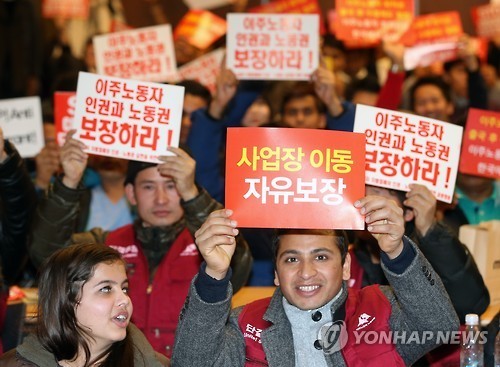Korean farmers, laborers less tolerant of migrants: survey
By Claire LeePublished : March 14, 2016 - 16:13
South Koreans who work in fishing, farming and construction industries are less tolerant of immigrants than those who belong to other professional fields, a report by the Gender Ministry showed on Monday.
Those industries in South Korea currently employ a large number of foreign-born laborers.
The research results reflect how South Korea’s working population may feel “threatened” by migrant workers, many of whom are male, said Ahn Sang-soo, a researcher at Korea Women’s Development Institute who led the report.
The study surveyed a total of 4,000 South Koreans aged 19-74 nationwide last year. It asked them to rate their agreement on a scale of 1 to 6 – with 1 being the lowest – toward 22 statements on multiculturalism, national identity and ethnic diversity among others.
Those industries in South Korea currently employ a large number of foreign-born laborers.
The research results reflect how South Korea’s working population may feel “threatened” by migrant workers, many of whom are male, said Ahn Sang-soo, a researcher at Korea Women’s Development Institute who led the report.
The study surveyed a total of 4,000 South Koreans aged 19-74 nationwide last year. It asked them to rate their agreement on a scale of 1 to 6 – with 1 being the lowest – toward 22 statements on multiculturalism, national identity and ethnic diversity among others.

On average, the surveyed Koreans showed a tolerance level of 53.95 out of 100 – with 100 being the most tolerant. This was a 2.78 points increase from 2011.
The research findings also showed that tolerance levels were lower than average among Koreans who are low-income earners, those with low education levels and housewives.
Ahn said Korean farmers, fishermen and construction workers, as well as those who belong to the same socioeconomic class, may feel that they need to “compete” against migrant workers.
According to Statistics Korea, about 90 percent of migrant workers in South Korea are employed in occupations that require physical labor, including farming and fishing. More than 70 percent of all foreign-born workers in South Korea’s farming industry are male, according to the International Organization for Migration’s 2013 report.
“Our research showed that Koreans, regardless of their education levels and occupation, who have foreigners as friends, colleagues at work, or relatives, have a high level of tolerance towards immigrants,” Ahn told The Korea Herald.
“But those who work in those particular industries – farming, fishing and construction – had lower tolerance levels (although they must run into migrant workers quite frequently at work).”
Currently, South Korea’s Employment Permit System, which was introduced in 2007 to attract more foreign workers to the country, makes it nearly impossible for those under the scheme to be granted permanent or long-term residency. The permit is limited to a maximum of 4 years and 10 months. Individuals must live in South Korea for five consecutive years and have general knowledge of the Korean culture and language to become a naturalized South Korean citizen.
Given such criteria, the easiest – and practically the only – way to acquire South Korean citizenship is through marriage to a South Korean national. As a result, more than 80 percent of foreign-born marriage migrants in South Korea are women.
Kang Mi-ok, assistant professor at Utah Valley University in the U.S., pointed out that South Korea’s immigrant policies are discriminatory against foreign laborers and support international marriages between Korean men and women from overseas.
In her book, “Why the (Korean) Conservatives Chose Multiculturalism,” she argued that migrant women were thought to be easier to assimilate into Korea’s patriarchal system and that there are not enough efforts made to protect migrant workers from workplace abuse and discrimination.
The research also found that 60.4 percent of Koreans think job opportunities should be given to Korean nationals first instead of foreign-born workers when the job market is down. Also 31.8 percent of them did not want to have immigrants as neighbors.
At the same time, a very low number of South Korean adults have participated in educational or social activities on multiculturalism, the report showed. Only 5.5 percent of them have taken classes on pluralism and diversity and 4.2 percent have volunteered at multicultural events or institutions.
Researcher Ahn also added that many surveyed Koreans had prejudiced views toward foreigners based on their country of origin. For example, many agreed to such statements: “Workers from first-world nations would be better at their jobs at work than those from developing countries” and “It’s better to make friends with those whose first language is English.”
By Claire Lee(dyc@heraldcorp.com)








![[Today’s K-pop] BTS pop-up event to come to Seoul](http://res.heraldm.com/phpwas/restmb_idxmake.php?idx=644&simg=/content/image/2024/04/17/20240417050734_0.jpg&u=)

![[Graphic News] More Koreans say they plan long-distance trips this year](http://res.heraldm.com/phpwas/restmb_idxmake.php?idx=644&simg=/content/image/2024/04/17/20240417050828_0.gif&u=)





![[KH Explains] Hyundai's full hybrid edge to pay off amid slow transition to pure EVs](http://res.heraldm.com/phpwas/restmb_idxmake.php?idx=652&simg=/content/image/2024/04/18/20240418050645_0.jpg&u=20240419100350)

